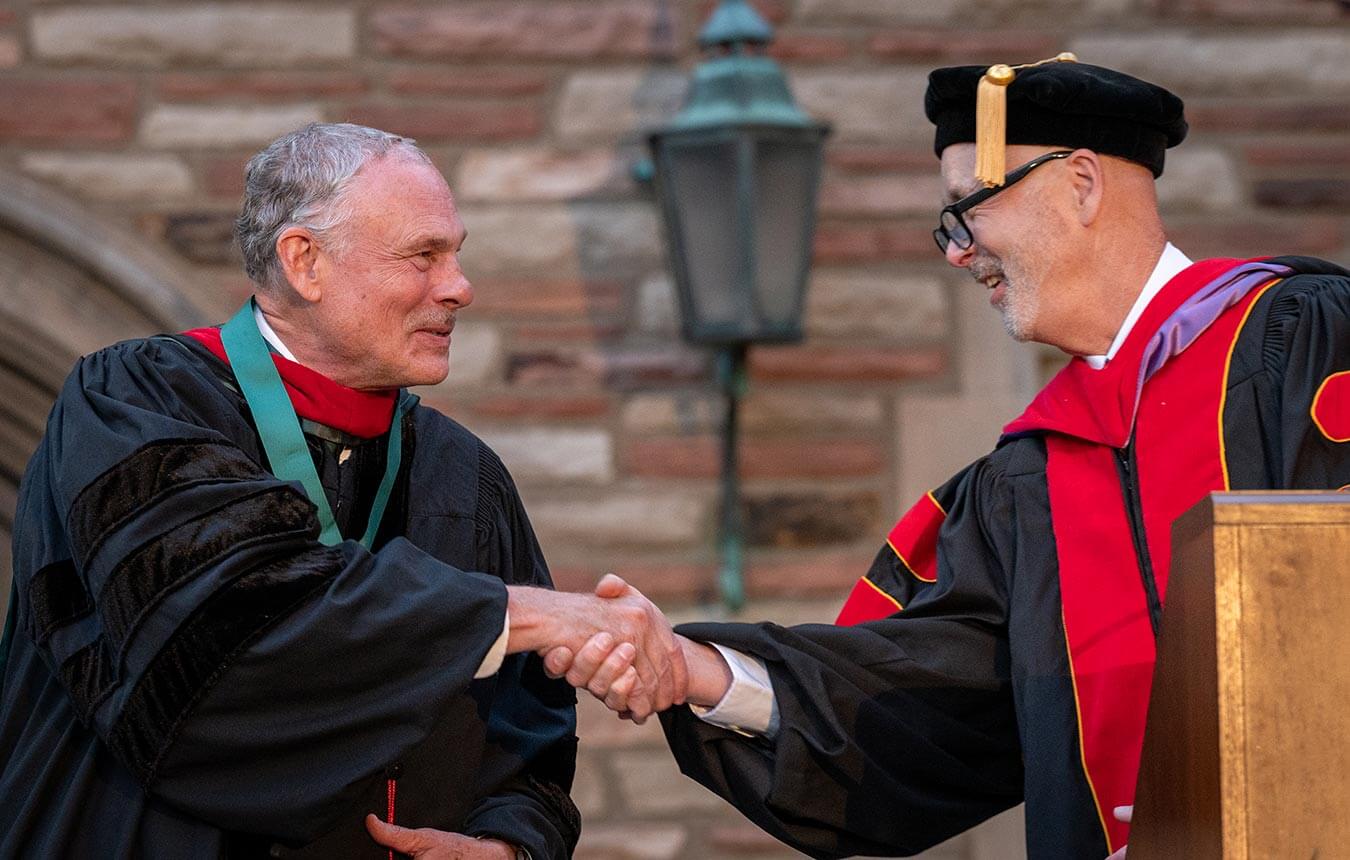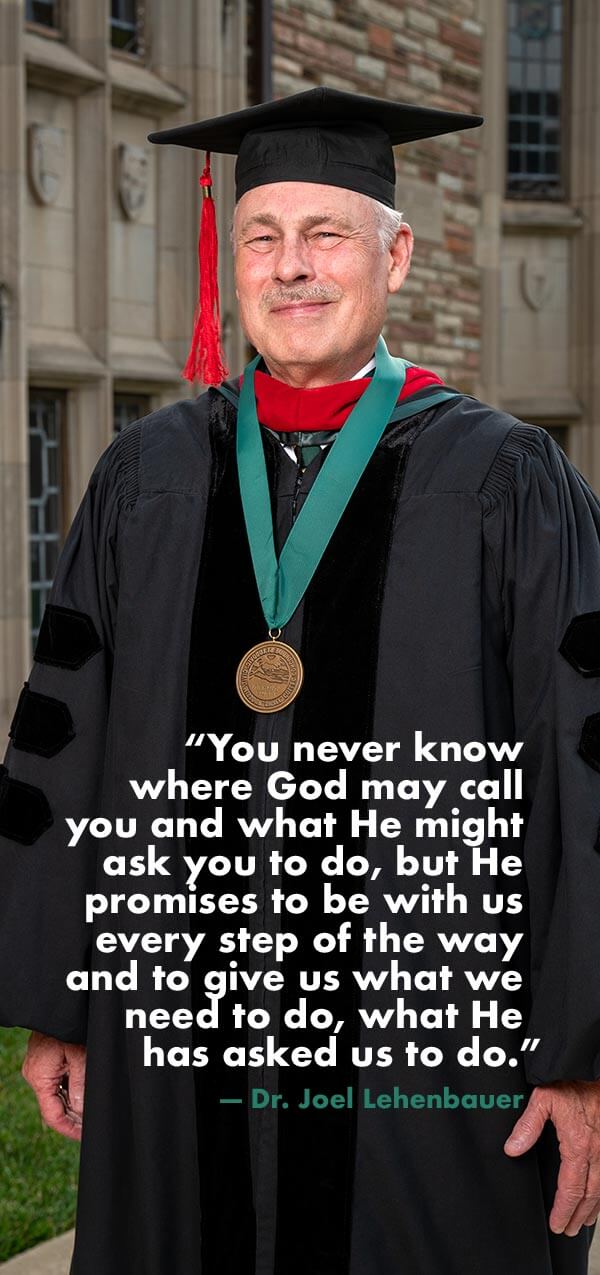
Concordia Seminary Newsroom
Dr. Joel Lehenbauer
Distinguished Alumnus Recipient

by Sarah Maney
“You never expect to get a call like that,” said Dr. Joel Lehenbauer, remembering the moment he learned he would receive the Distinguished Alumnus Award, an annual award given to a Concordia Seminary graduate who has rendered exceptional service in parish ministry, mission field, preparation of church workers or Synod service.
Not only would Lehenbauer, executive director of The Lutheran Church—Missouri Synod (LCMS) Commission on Theology and Church Relations (CTCR), receive the award during Commencement 2024, he also would be delivering the Seminary’s Commencement address.
Upon learning the news of the award, Lehenbauer immediately thought about how his late father, a faithful LCMS pastor and district president, would be pleased. And then he reflected on the Lehenbauer lineage.
His great-grandfather, Johann Konrad Christian Lehenbauer, was the first Lehenbauer to attend Concordia Seminary and often worked as the buggy driver for Dr. C.F.W. Walther, the Seminary’s and the LCMS’ first president. Many of the Lehenbauer family church workers can be traced to Johann’s son Conrad, Lehenbauer’s grandfather. By birth or marriage, four generations of the Lehenbauer family have produced 24 pastors — more than half of whom attended Concordia Seminary, including Joel. Married to the love of his life, Hope, the couple have four adult children and five grandchildren — continuing the Lehenbauer legacy.
Lehenbauer is a three-time Concordia Seminary alum; he has earned a Master of Divinity (M.Div.) (’84), along with the Hoerber-Hanser award for the highest GPA in his graduating class; a Master of Sacred Theology (’91); and a Doctor of Philosophy (’04).
In addition to receiving theological instruction and pastoral formation during his Seminary studies, he also grew in self-discipline and humility.
“The professors humbled us and they did so intentionally,” said Lehenbauer, recalling his time as an M.Div. student. “They let us know right away and in no uncertain terms that they were in charge. They were a lot smarter than we were, and they didn’t put up with any kind of arrogance, cockiness or nonsense. And that was good.”

The qualities of self-discipline and humility — recognizing that he doesn’t have all the answers — have served him well; first in parish ministry as a sole pastor at St. Paul Lutheran Church in Hillsdale, Mich., (1985–90); and during his 33 years of service with the CTCR. Today Lehenbauer serves as executive director of the CTCR, a position he has held since 2008.
As executive director, Lehenbauer serves as the CTCR’s chief spokesman. He contributes to the drafting of multiple reports and opinions, participates in fellowship discussions with dozens of churches around the world leading to the recognition of church fellowship with the LCMS, and plans and organizes national and international theological and ecumenical conferences.
“You can’t serve on the CTCR and think you’ve got all the answers to everything,” he said. “We get the hard questions, and we have to remain humble about it and recognize that there are a lot of people from whom we can learn. And so, I credit my time at the Seminary for helping me begin to learn those qualities and seek to grow in them.”
The CTCR was created by the LCMS in 1962 to help the Synod speak with a single united voice on matters of theology and church relations. “The CTCR takes that mandate very seriously. I take that mandate very seriously,” Lehenbauer said. One of the ways the CTCR does this is by deliberately bringing the faculties of Concordia Seminary and Concordia Theological Seminary, Fort Wayne, Ind., together. The presidents of both seminaries are members of the CTCR. Each faculty appoints two members of its faculty to the CTCR and the LCMS president typically places other members of the faculty on the CTCR. The LCMS Council of Presidents does the same thing. Typically, more than a third of the members of the CTCR also are members of the two seminaries’ faculties.
“They’re a critical presence on the CTCR. The vast majority of CTCR reports have been drafted by seminary professors, and I just think that’s ingenious. Lay people, district presidents, teachers are all involved but the core of the commission are the seminaries,” Lehenbauer said. “It helps the seminaries communicate with each other better. It helps keep the Synod united.”
Recalling his years of ministry service, Lehenbauer reflects on God’s faithfulness. “You never know where God may call you and what He might ask you to do,” Lehenbauer said. “But He promises to be with us every step of the way and to give us what we need to do, what He has asked us to do. So, I’m very thankful to Him and grateful to the Lord for all the blessings that He’s given me and the ways that He’s allowed me to serve.”
Sarah Maney is manager of communications at Concordia Seminary, St. Louis.